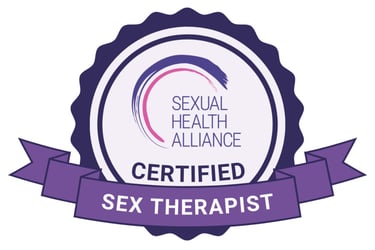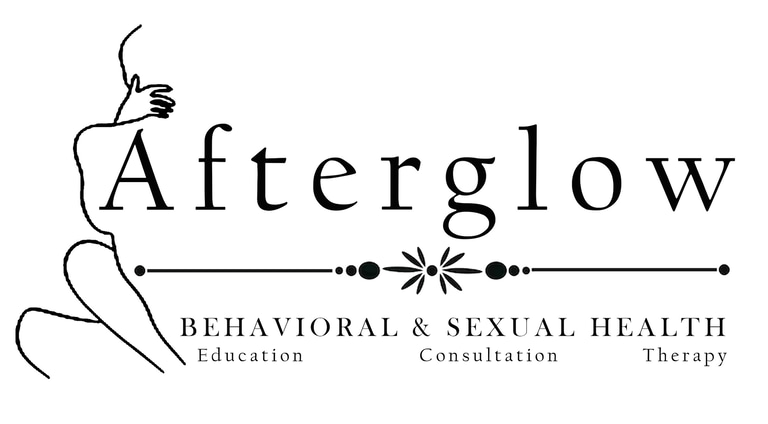Why Seeing a Certified Sex Therapist Matters (and Why a Weekend Workshop Won’t Cut It)
This blog explores why seeing a certified sex therapist is essential when addressing intimacy and sexual health concerns. It gives a quick history of sex therapy, from Masters and Johnson’s groundbreaking research in the 1960s to today’s rigorous certification standards set by organizations like AASECT. The post highlights the crucial differences between licensed, certified professionals — who have graduate degrees, supervised training, and ethical accountability — versus unregulated “I took a class” helpers, who may offer advice but lack the depth and safeguards of true certification. With humor and therapeutic guidance, it emphasizes that clients deserve evidence-based care, safety, and professionalism when navigating sexual well-being, reminding readers to always check credentials before choosing support.
GENERAL SEXUAL HEALTH
Dr. kent
9/22/20254 min read


When your car’s making a noise that sounds suspiciously like a blender full of marbles, you don’t take it to your cousin’s buddy who once “watched a YouTube video on alternators.” You take it to a certified mechanic. The same rule should apply when your sex life is clunking, rattling, or refusing to start. That’s where certified sex therapists come in — the trained mechanics of intimacy, arousal, and communication.
A (Brief but Juicy) History of Sex Therapy
Sex therapy has its roots in the mid-20th century, when the cultural climate was shifting faster than a disco ball at Studio 54. Early pioneers like Dr. William Masters and Virginia Johnson revolutionized the field in the 1960s by observing, documenting, and — let’s be honest — probably shocking their academic peers with actual human sexual responses in the lab. They wrote Human Sexual Response in 1966, and suddenly, sex wasn’t just whispered about in smoky backrooms — it was studied, charted, and graphed.
In the 1970s, Helen Singer Kaplan merged behavioral science with psychodynamic therapy, giving us modern sex therapy as a structured treatment approach. Fast forward to today, and professional organizations like the American Association of Sexuality Educators, Counselors, and Therapists (AASECT) set rigorous standards for certification, ensuring that sex therapy isn’t just winging it — it’s grounded in evidence-based practice.
Certification vs. “I Took a Class Once”
Here’s the catch: not everyone who calls themselves a sex therapist is actually certified. The title “sex therapist” isn’t legally protected in the same way “psychiatrist” or “dentist” is. That means anyone can slap it on a business card, whether they’ve completed 150 hours of specialized, supervised training through AASECT… or just signed up for a “Tantric Life Coach” weekend retreat at a Holiday Inn.
Certified sex therapists:
Have advanced graduate degrees (psychology, counseling, social work, marriage and family therapy, etc.).
Are licensed in their state to practice therapy.
Complete specialized training (often 150+ hours of coursework) in human sexuality.
Receive supervised clinical hours with clients specifically focused on sexual issues.
Must maintain continuing education credits to stay current with research and ethics.
“I Took a Class” sex helpers:
Might have read a book, watched a webinar, or done an online module.
May be well-meaning, charismatic, and excellent at Instagram reels.
Usually don’t have to follow a professional code of ethics or licensure requirements.
Can offer advice, but not necessarily evidence-based, safe, or trauma-informed therapy.
It’s the difference between consulting a cardiac surgeon and chatting with someone who’s watched Grey’s Anatomy and feels “spiritually aligned with cardiology.”
Why Certification Matters (a Lot)
1. Safety First
Certified sex therapists are bound by ethical codes and confidentiality laws. They know how to navigate sensitive issues like sexual trauma, identity, orientation, and health conditions without causing harm. A “class-only” coach might mean well but can unknowingly retraumatize someone faster than you can say “chakra alignment.”
2. Evidence Beats Anecdotes
Sex therapists lean on research, clinical trials, and decades of cumulative knowledge. They know what interventions help with delayed ejaculation, mismatched libidos, or painful intercourse. Someone without certification may rely on personal experience (“This essential oil changed my marriage!”), which is lovely for them — but not exactly reproducible science.
3. Scope of Practice
A certified sex therapist won’t just toss advice into the void. They assess mental health, relationship dynamics, medical history, and cultural context. If something falls outside their lane (like needing medical tests for hormone levels), they refer out appropriately. Uncertified practitioners often don’t know where their lane ends, which can leave clients spinning in circles.
4. Insurance and Accountability
Licensed, certified sex therapists can often provide therapy that’s covered by health insurance. If something goes wrong, there’s a licensing board to hold them accountable. With an uncertified “sexpert,” your only recourse might be leaving a Yelp review.
The Humor in It All
Imagine this scenario:
You’ve decided to seek help for intimacy issues. You Google “sex therapist near me” and land on two options:
Option A: Dr. Jamie Smith, PhD, LMFT, CST — AASECT Certified, 15 years of experience, peer-reviewed publications, supervised training in sexual dysfunction.
Option B: “Sage Moonlight,” who “discovered her gift” during a silent yoga retreat, completed a weekend “Sacred Intimacy Workshop,” and now offers sessions out of her yurt (cash only, crystals optional).
Both might give you tea and a listening ear. Only one has malpractice insurance.
What the Data Says
Research consistently backs the effectiveness of professional sex therapy:
A meta-analysis in the Journal of Sex & Marital Therapy (2016) found that structured sex therapy led to significant improvement in sexual satisfaction and functioning across multiple issues, from erectile dysfunction to desire discrepancies.
Studies show that therapy is most effective when the therapist has both clinical training and specialized sexual health education. In contrast, anecdotal or “alternative” coaching tends to show mixed results, often dependent on the client’s preexisting motivation rather than treatment quality.
According to AASECT, as of 2024, there are roughly 1,500 certified sex therapists in the U.S. — a small, highly trained group compared to the sea of uncertified coaches.
Translation: finding a certified sex therapist may feel like finding a rare Pokémon, but when you do, you’ve got something powerful.
A Therapeutic Perspective
Here’s the most important part: seeking sex therapy is already a vulnerable, brave step. You’re showing up with real concerns — whether it’s low desire, performance anxiety, or learning to navigate intimacy after trauma. You deserve someone who can hold that space with skill, compassion, and professionalism.
Certified sex therapists aren’t here to shame you, fix you, or prescribe “50 Shades of Anything.” They’re here to help you understand your body, your mind, and your relationships in a way that leads to healing and growth. It’s therapy — with an expertise in sex — not sex disguised as therapy.
Final Thoughts (and a Gentle Nudge)
If you’re considering seeing a sex therapist, do yourself the favor of checking credentials. Look for AASECT certification (or comparable organizations internationally), confirm state licensure, and don’t be afraid to ask, “Can you tell me about your training?” A real professional will happily explain.
Think of it this way: you wouldn’t let someone with a “Weekend Warrior” badge perform brain surgery. Don’t let them perform therapy on the most tender, intimate parts of your life either.
Certified sex therapists are the real deal — evidence-based, ethically bound, professionally trained. And sometimes, they’re also funny, approachable, and able to make you feel less like a case study and more like a human being with normal, fixable challenges.
Your sex life deserves more than a motivational quote over a stock photo of a sunset. It deserves expertise. And when in doubt, ask yourself: do I want a therapist, or do I want someone who once took a “sensual breathing” class at Burning Man?
Choose wisely. Your future self (and your partner) will thank you. And let the Afterglow begin.
Connect with us
© 2025. All rights reserved.
dr.kent.sexhealth@gmail.com


